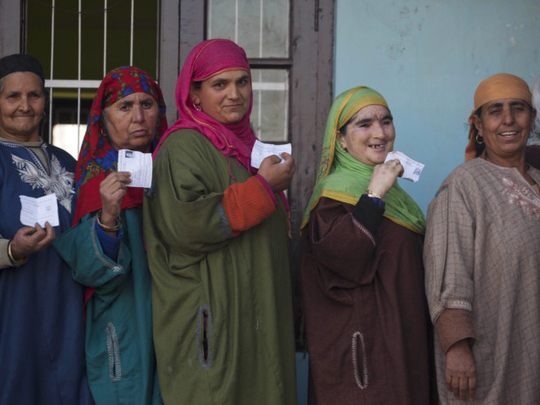
The unexpectedly high turnout in the ongoing state elections in Jammu and Kashmir (J&K) is puzzling. Is it a triumph of democracy and an end to the politics of boycott or is it just a passing moment in that state’s troubled history; a history replete with paradoxes and many twists and turns?
The Pakistani wife of a one–time boycotter campaigning in these elections is certainly unique: The use of a Pakistani television channel for canvassing votes is equally exceptional and that the Bharatiya Janata Party (BJP), a party that has on and off talked about repelling Article 370, should be a serious contender for power, is baffling.
Going back in time, the very first paradox is that J&K should be a part of India. Demography and the principle of contiguity should automatically have made this princely state a part of Pakistan. There has also been much controversy surrounding the Radcliffe Line, which partitioned united India. If Gurdaspur in undivided Punjab had been awarded to Pakistan, there would have been no land access to Kashmir from the Indian side.
Next, strange as this may sound, Indian Prime Minister Narendra Modi’s mantra of development has perhaps pushed identity politics to the background and the voter standing in long queues in the blistering cold is not engaged with the larger questions of statehood and independence, but with simple day to day issues of basic amenities, better schools and medical facilities. No different from a voter in Karnataka or Maharashtra. It is nevertheless an irony that Modi, who until recently was reviled as one of the most divisive leaders India has seen, should have provided this impetus for driving identity politics to the margins.
Ironies, however, abound and the political journey of Sajjad Gani Lone from a boycotter to an active participant in these elections and a possible ally of the BJP in the state is one of them. Equally remarkable is his wife, Asma Khan Lone’s decision to campaign for him, for she is the only daughter of Amanullah Khan, the co-founder of the Jammu Kashmir Liberation Front (JKLF).
Sajjad at one time accused Pakistan-based elements of having assassinated his father Abdul Gani Lone, the founder of the People’s Conference. He has since recalibrated his stand and chosen to mute his utterances on this subject. Asma is a Pakistani citizen and an active politician and not a housewife supporting her husband’s campaign. She has not renounced her Pakistani passport and is the sole heir to her father’s legacy. Amanullah was the chief architect of the armed struggle in 1988 to end Indian rule in Kashmir.
Among the many surprises of these elections none can be more astonishing than the BJP’s use of Pakistani soap to reach audiences in J&K. In between commercial breaks of popular Pakistani serials like Mastana Mahi and Badi Aapa, Modi’s message in chaste Urdu is repeated at high frequency. Zee TV’s Zindagi channel — a big hit in the valley — is also used to ramp up Modi’s message of good governance.
Sanjay Kak writing in the Caravan, however, comes closest to the truth behind this upsurge in voter turnout. His essay Ballot Bullet Stone is a compelling read. He tells us vividly how the mood during the parliamentary polls held in April 2014 was vastly different and the numbers were nowhere close to what is being seen now. Second, he makes a clear distinction on what is at stake for the voters then and now. The contrast is sharp and stark. He says “Kashmiris know that the members of parliament they are asked to vote for have no bearing on the masla-e-Kashmir or ‘the Kashmir issue’, whose central question of political self-determination has vexed the region for more than 65 years. Nor can their members of parliament significantly affect citizens’ access to roads, schools, hospitals or even the all-important neighbourhood electricity transformer. Those are the domain of the state government.
This should be a reality check for all those who call these elections a landmark in the state’s history. Yet, who can deny that the absence of violence and the innumerable accounts of one-time stone-throwers being lured by the ballot is a pivot of far reaching significance? Undoubtedly there is ambivalence on the larger issues, accompanied by a sense of fatigue and hopelessness. Why chase a chimera like ‘azadi’ (independence) when pressing matters like getting a paved road through your village is the more immediate concern?
There are others who say that the separatists have sent word to go soft on the boycott to ensure the BJP is shut out of local politics; ‘Mission 44’ is BJP’s slogan to get a majority in the 87-member state legislature for the very first time. If so, it will be the ultimate irony that in wanting to thwart the BJP, one of the unintended consequences is to restore faith in the ballot. And with the voter having tasted the power of the ballot, the lure of the bullet and the stone will have faded forever.
Will Sanjay Kak then write Stone Bullet Ballot?
Ravi Menon is a Dubai-based writer, working on a series of essays on India and on a public service initiative called India Talks.









